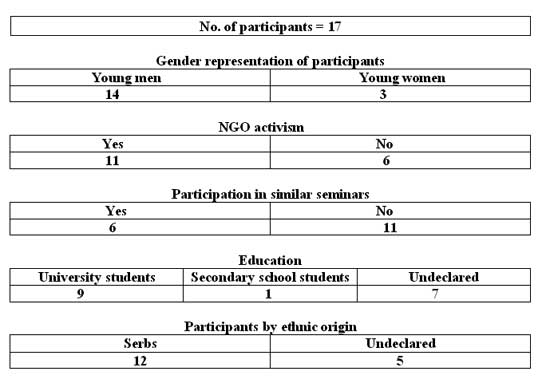SERBIA OUTSIDE EUROPEAN
INTEGRATION PROCESSES REMAINS
"A BLACK HOLE OF THE BALKANS"
The second in the series of the seminars planned under the project
"Capacitating Future Decision Makers: A Follow-up Program"
Novi Sad, December 14-16, 2007
Unlike church dignitaries and advisers to the Premier, young people
would not respond to a draft and partake in some new warfare - this time for keeping
Kosovo in Serbia. According to the participants in the seminar, Serbia would not go at war
any more, and particularly not for the safeguard of Kosovo within its borders. Namely,
when asked, "Would you respond to a draft and fight for Kosovo?" all of them,
except for one, replied negatively. While the said participant made no bones that Kosovo
should be defended by arms if necessary, the rest said no to war and mobilization. The
great majority of their answers were as follows: "Why should I go to war for the
state that does not respect me?," "No, I wouldn't, I would leave the
country," "I would be senseless to fight for a lost cause," "I
wouldn't go to war but would defend my homestead if necessary," "I would
definitely not, and just hope the Russians would again fail to support us," "I
would hit the street to protest against Kosovo's secession but would not fight against
it," etc.
When asked whether Serbia would join the EU without Kosovo, they
provided the following replies: "Yes, it should since there is no mechanism for
keeping Kosovo," Yes, because if it remains in Serbia, Kosovo will be a constant
hotbed of crisis and that is not what we need," "Kosovo's independence should be
utilized for speedier accession to the EU," "Kosovo is a closed chapter, we have
lost it and must accept that fact," "The matters should be settled through a
compromise," "No one should impose conditions for accession and we should keep
Kosovo if possible," etc.
In the participants' view Serbia will be "a black hole of the
Balkans" if it remains outside European integration processes. The issue of
integration was deliberated as a two-way process - accession to the EU and integration of
various groups into the Serbian society. A successful "local" integration
facilitates Serbia's accession to the EU, said the participants.
The participants were divided into four groups - educational, political,
religions and ethno-cultural. Each group was asked to put forth the measures that would
pave the way to its integration into the Serbian society. The measures the participants
mostly pinpointed were the following: changed social climate, abandoning nationalism, new
laws adjusted to European standards, creation of a different cultural model, inclusion and
positive discrimination, curbing sensationalism and hate speech in the media, journalistic
professionalism and accountable media, depolitization of religion, innovation of the
education system (religious instruction should be replaced by the classes providing
comparative overviews of different religions), introduction of new technologies in
education, advanced training for professors and students abroad, more respect for human
rights and more efficient mechanisms for the protection of human rights.
Asked whether human rights provide a manipulative pattern enabling the
international community to interfere into domestic affairs, the great majority of the
participants replied negatively. "Those calling human rights a manipulative pattern
are themselves prone to manipulation to attain their petty interests," said a
participant.
What motivated the participants to join the seminar was the wish to
learn "new things" and socialize, showed the final evaluation meeting. Some
suggested that the seminars to come should include younger members of the Democratic Party
of Serbia and the Serbian Radical Party.
The project is being implemented with the assistance of the Balkan Trust
for Democracy.

|
